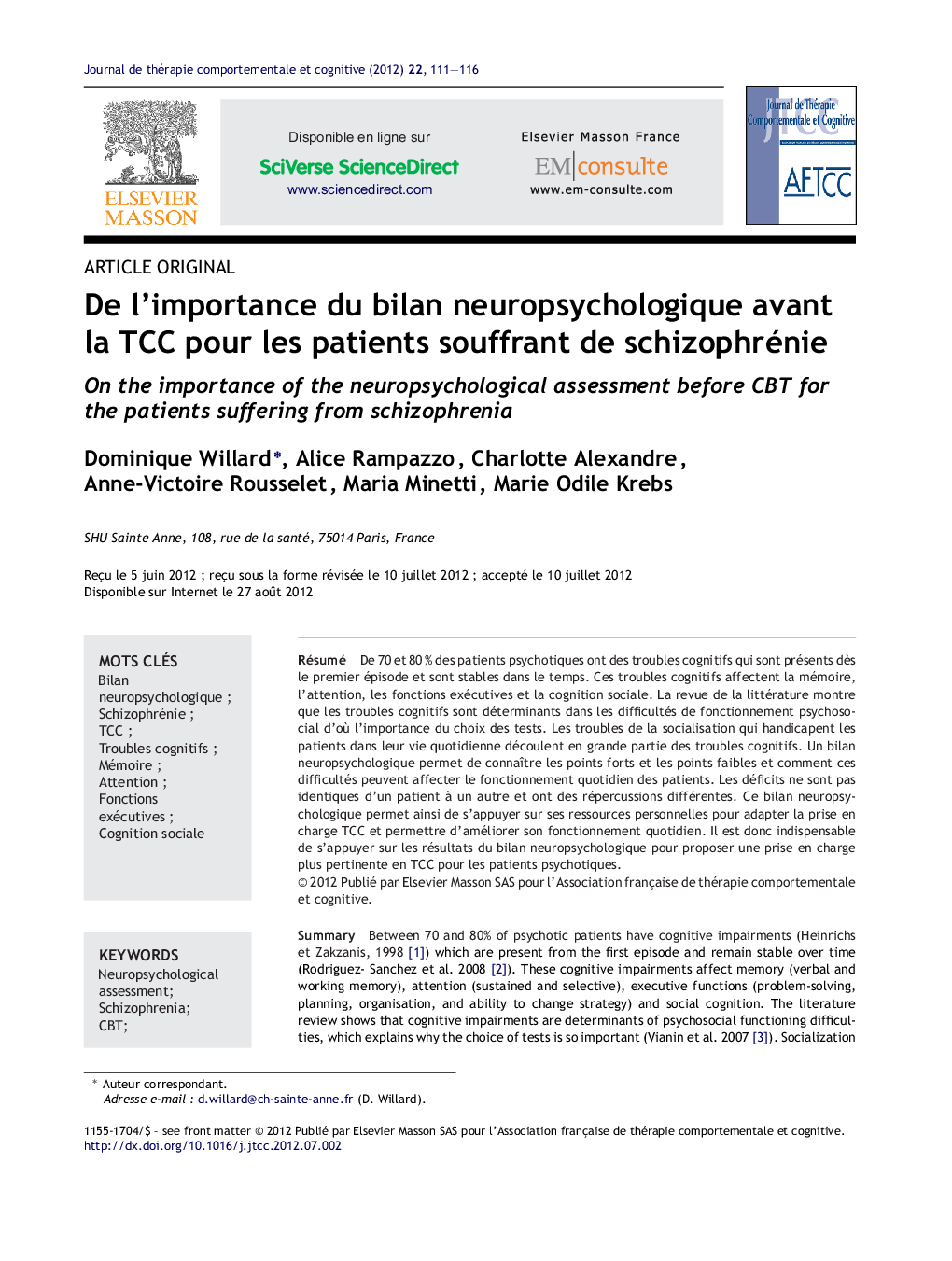| کد مقاله | کد نشریه | سال انتشار | مقاله انگلیسی | نسخه تمام متن |
|---|---|---|---|---|
| 934667 | 923685 | 2012 | 6 صفحه PDF | دانلود رایگان |
عنوان انگلیسی مقاله ISI
De l'importance du bilan neuropsychologique avant la TCC pour les patients souffrant de schizophrénie
دانلود مقاله + سفارش ترجمه
دانلود مقاله ISI انگلیسی
رایگان برای ایرانیان
موضوعات مرتبط
علوم پزشکی و سلامت
پزشکی و دندانپزشکی
روانپزشکی و بهداشت روانی
پیش نمایش صفحه اول مقاله

چکیده انگلیسی
Between 70 and 80% of psychotic patients have cognitive impairments (Heinrichs et Zakzanis, 1998 [1]) which are present from the first episode and remain stable over time (Rodriguez- Sanchez et al. 2008 [2]). These cognitive impairments affect memory (verbal and working memory), attention (sustained and selective), executive functions (problem-solving, planning, organisation, and ability to change strategy) and social cognition. The literature review shows that cognitive impairments are determinants of psychosocial functioning difficulties, which explains why the choice of tests is so important (Vianin et al. 2007 [3]). Socialization disorders which restrict patients in their daily lives are largely the result of cognitive impairments (Penn et al. 2008 [12]). Given the large heterogeneity in patient cognitive profiles, it is essential to consider the nature of impairments in each patient. A neuropsychological assessment allows us to find strengths and weaknesses, and to discover how these difficulties can affect the daily functioning of patients. The deficits differ from one patient to another and have different implications. These impairments cannot be predicted by other clinical characteristics. This neuropsychological assessment makes it possible to synthesize the results in concrete and practical terms in relation to daily living (Vianin 2009 [14]). It is possible, therefore, to identify the patient's impairments and also the resources they have to rely on. This information is used to specify and guide personalized treatment of the patient. The presentation of a clinical vignette shows the contributions of neuropsychological assessment to CBT treatment. It concerns the CBT treatment of a young 27-year-old woman with a schizophrenic disorder. Her problems began in early childhood. She had difficulties in her studies and also in her working life. Her psychiatrist referred her to us for cognitive remediation treatment. At the same time, CBT was offered with the aim of improving stress management and self-esteem (Lecomte et al. 2001 [15]). This case study shows the discrepancies between the presentation of the patient and her discourse; between the detailed elaboration she was capable of during exercises and her infantile attitude; between her chaotic life path and her intellectual abilities. She complained of problems paying attention and concentrating. Repeated loss of concentration during the execution stage of activities highlighted problems with sustained attention. These problems objectified during the neuropsychological assessment can have an impact on the suggested exercises and must be taken into account. The importance of therapeutic alliance is paramount (Brazo 2008 [16]). Effective communication which takes into account the patient's cognitive impairments is required to improve and reinforce it. Cognitive impairments can also affect how the patient understands instructions and, therefore, how the therapist is able to give their instructions. Only neuropsychological assessment can provide the therapist with these elements. For example, evaluation of intellectual efficiency tells us if the patient is capable of self-observation or if it is necessary to repeat and rephrase what has been said. Attention deficits imply short sessions. It may also be desirable to consider the difficulties of analyzing the context and expressing wishes clearly. It is useful to take into account the personal deficits of each patient from the start of treatment. From the outset, the question of the duration and frequency of sessions is important. CBT has always stressed the importance of evaluation, and neuropsychological assessment is undeniably part of this. In cognitive remediation it is now well-established that neuropsychological assessment is an essential preamble to therapy. The therapist can then use the personal resources of the patient to adapt the treatment. We believe that neuropsychological assessment should become obligatory for psychotic patients and be part of the initial assessment to provide more appropriate cognitive behavioural therapy.
ناشر
Database: Elsevier - ScienceDirect (ساینس دایرکت)
Journal: Journal de Thérapie Comportementale et Cognitive - Volume 22, Issue 3, September 2012, Pages 111-116
Journal: Journal de Thérapie Comportementale et Cognitive - Volume 22, Issue 3, September 2012, Pages 111-116
نویسندگان
Dominique Willard, Alice Rampazzo, Charlotte Alexandre, Anne-Victoire Rousselet, Maria Minetti, Marie Odile Krebs,